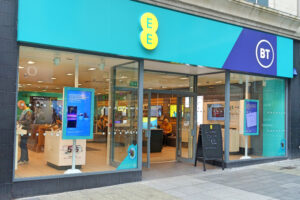
It’s still good to talk, but increasingly BT customers are doing it wherever they like via connected mobile devices rather than fixed-line broadband and old-fashioned telephones.
In recognition of this generational shift, BT quietly announced in a blog post on Wednesday that after more than 30 years and some of the UK’s highest-profile ad campaigns, its flagship consumer brand is to take a back seat to upstart EE in its marketing strategy.
The company, which came into being as British Telecom in 1980 when it was still part of the Post Office, and adopted BT as its name and corporate brand in 1991, said it was evolving the way it markets to consumers to focus on using the EE identity.
It stressed that the BT brand is not being retired and said it will play an “important but more focused role” for consumer customers who have standalone broadband and landline services. EE will now take centre stage, not only for mobile services but bundles that include superfast broadband.
“Having both BT and EE in an already overcrowded consumer market means we must have two of everything, and that makes life harder for our customers and our people,” said Marc Allera, chief executive of BT Consumer, in the blog post. “We need to simplify things. From today, we’re starting the preparations to make the EE brand our flagship brand for consumer customers focusing on convergence and future services.”
The BT brand will also continue to be used for BT Sport, the pay-TV service set to become part of a joint venture with Warner Bros Discovery, and become the lead brand for its business-to-business and global operations. BT will also remain as a co-brand on the company’s 550 high street stores and appear in ad campaigns.
BT is one of the biggest advertisers in the UK with media industry sources estimating that the company spent more than £150m on all forms of marketing for its BT, EE and Plusnet brands in the last year.
Over the years its TV advertising campaigns have featured the late Bob Hoskins – telling viewers “it’s good to talk” in the 1990s – and, more recently, Hollywood stars including Jeremy Renner, Alex Baldwin and Ryan Reynolds.
EE, which BT acquired for £12.5bn in 2016, has existed as a brand since 2012 after it was formed from the merger of France’s Orange and Germany’s T-Mobile.
Kester Mann, director of consumer and connectivity at CCS Insight, said: “Running two major consumer brands was never something BT could continue indefinitely. For the BT brand, the announcement represents a failure to resonate with the UK’s increasingly technology-savvy consumers.
“EE appears better equipped to spearhead the next chapter for BT’s Consumer business as it looks to bring new products and services to market beyond traditional connectivity.”
BT, which has 20m broadband, phone, TV and landline customers, said that the EE brand has “captured the hearts of consumers across all demographics … with a strong brand that can stretch into new areas”.
Read more:
BT unveils plans to make EE its consumer-facing brand





